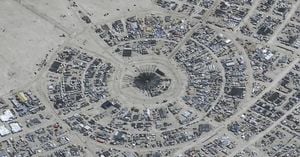Prince William and Kate Middleton's recent decision to skip the annual BAFTA awards gala has ignited public outrage, leading to significant debate over their roles as future monarchs and parents.
The highly publicized couple traveled to Mustique, a luxury private island in the Caribbean, to escape the scrutiny of royal duties and enjoy quality family time during school holidays. The trip follows a challenging year marked by the health issues of both Kate and her father-in-law, King Charles III, as they have taken steps to rejuvenate their family bonds.
Critics were quick to voice their disapproval as the absence of the Prince and Princess of Wales at the illustrious BAFTA event raised eyebrows. Traditionally regarded as the time for the monarchy to engage with British cultural life, this year’s gala was particularly significant, making their absence even more conspicuous. Since 2017, their attendance at the BAFTA awards has become customary. An earlier absence due to Kate's health concerns only served to amplify the current disappointment felt by many.
The public is divided over the couple's choice. While some sympathize with their desire to prioritize family, especially after facing health challenges, others feel it is their institutional duty to represent the monarchy at such prestigious events.
Experts suggest the royal family's retreat to Mustique—a location cherished for its exclusivity and privacy—posed the need for balance between royal obligations and the healthy upbringing of their children, Prince George, Princess Charlotte, and Prince Louis. The island, favored by British royalty for decades, is known for attracting celebrities and public figures alike, allowing them to unwind from the pressures of public life.
The history of Mustique dates back to the 1970s when it was popularized by Princess Margaret, highlighting its long-standing connection to the British royal family. Its nature as a private haven means journalists and photographers are often kept at bay, allowing visitors to enjoy tranquility—a luxury not easily afforded elsewhere.
While the elite of British film gathered to celebrate the finest each year has to offer, the royal couple made headlines for taking time off from their engagements. Many see this as a step backward for the monarchy's mission to connect with the public, especially targeting cultural moments such as the BAFTA awards.
Despite the backlash, some defend the couple's decision. They argue quality family time should not be underestimated, particularly after such challenging months. The situation raises important questions about the responsibilities royal figures have toward cultural events versus personal family commitments.
The duality of royal expectations and personal lives has become increasingly blurred over time. With the spotlight ever-present, Prince William and Kate find themselves riding the wave between public duties and private aspirations. This incident highlights how modern royal engagements require constant negotiation of personal desires against public expectations.
Moving forward, the couple's decision to vacation instead of attending high-profile events poses additional challenges. It begs the question: how can they effectively manage their responsibilities without losing public trust and connection?
Royal watchers and citizens alike will be keeping close tabs on the couple's next moves. Will they return to the BAFTAS and similar events with renewed vigor, or will they continue to prioritize their family time? This tension will likely define Prince William and Kate Middleton's public persona as they navigate their roles both as royal figures and as nurturing parents.
Despite the controversy, it remains clear: Prince William and Kate Middleton's popularity remains relatively untouched within the hearts of many British citizens, who still look to them for inspiration and guidance as they balance their royal responsibilities with the demands of family.”



